An overview of the rent strike movement in the US and Canada. This article was first posted at It's Going Down.

The number of people infected with the coronavirus across the world has now topped 1 million, with almost a quarter of those testing positive for COVID-19 residing within the United States. The White House is now predicting upwards of 200,000 people will die from the virus in the US, a number which Trump recently praised as low, stating that he has done a “very good job” at containing the outbreak, despite all evidence to the contrary.
The fallout from the pandemic has had a massive economic impact. CNN reports an increase of unemployment claims by a catastrophic 3,000%, raising the unemployment rate to around 10% – and many expect it to raise to upwards of 30% or higher. In response, many banks and State institutions have pushed to issue protections to those paying mortgages and cancel foreclosures, however renters are left scrambling to make rent.
With the threat of homelessness looming in many people’s minds throughout March as the crisis moved from back page news story to global pandemic, calls for a rent strike grew from viral memes into a real world movement. Despite attacks in the corporate press, on April 1st, the rent strike officially kicked off across the US and Canada, as entire buildings and apartment complexes announced their refusal to pay and support grew within the wider population for a rent freeze.
By the evening of April 1st, CNN was even running an entire segment on the strike, showcasing the degree in which the campaign has exploded into the popular imagination of millions of people. This in itself is a testament to the hard work of grassroots organizers, the massive proliferation of flyers, posters, graffiti messages, and the now iconic white sheets which have come to symbolize the rent strike, and the countless hours spent between neighbors in meetings and online discussions.
But perhaps the greatest power of the strike, is that it has encouraged and pushed so many people to actually organize and come together with other community members. By providing hotline numbers and organizing guides, local tenant unions, autonomous groups, and community organizations have worked to bring those unable to pay their rent into a much larger struggle. This process has thus in turn created more organizers: it has increased the capacity of people to self-organize and fight back against forces so often seen as untouchable.
We should be clear that while the rent strike is clearly growing – this is a long term struggle. People will need to prepare themselves for the eviction fights and battles to come, provide mutual aid, build support from surrounding neighbors, and link up with lawyers. Moreover, we’ll have to keep organizing on the ground to bring more and more people into the strike, who as time goes on, will be increasingly unable to pay their rent as the crisis continues. We’ll also have to counter the narratives pushed by the media and landlord class and articulate our ideas in a clear way to other working-class and poor people about why they should join the strike.
What follows is our roundup of rent strike activity. If we missed something, you want to send in a larger report, or want to come on our podcast to talk about the strike in your area – don’t hesitate to email us at: info at itsgoingdown dot org.
Pacific Northwest

Rent Strike Posters in Seattle
In the Seattle area, the Seattle Rent Strike blog also has a collection of “Why We Are Striking” statements from people. Here’s a sample:
I live in First Hill, and I’m going on rent strike because I’m concerned about my neighbors. I’m organizing a building with 30 units, and if I can get close to 50% participation we’ll strike to have rent waived completely in April. If we can’t reach that threshold we’ll ask for a 50% rent reduction for the whole building, and if we can’t get that we’ll try it all again for May’s rent. We’ll also organize the rest of our property management company’s buildings remotely. Renters can’t pay rent without steady incomes or government assistance, and we’re getting neither! The only way we can survive the next few months is to stand together in solidarity! No matter what your current employment status is, work together with your neighbors. We’re all on the chopping block now!
In Olympia, a variety of homes, businesses, and tenant buildings have joined the strike. Local organizers have stated that they are working with people in various apartment complexes who are also working to develop tenant councils. According to Olympia Rent Strike, who spoke to It’s Going Down over Twitter:
There’s at least 40 households who have pledged, and countless others are on de facto rent strike, with organizing happening at major apartment complexes. There’s a growing number of Downtown businesses that are teaming up as well.
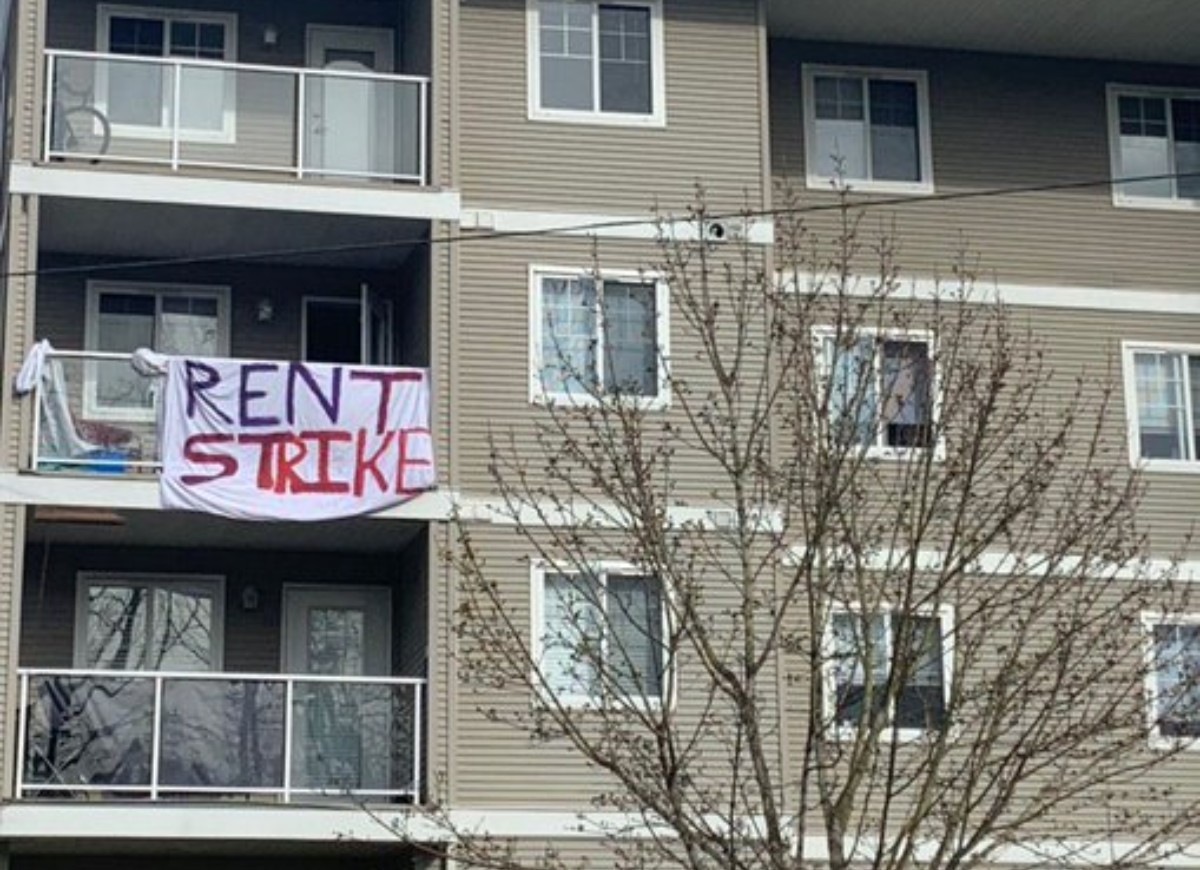
Rent Strike Banner in Washington
Bay Area
Like other major metropolitan areas, in the bay area, there is a combination of both public rent strikes and also many people who simply are not paying. Currently there is a bay area rent strike hub that has several rent strikes listed – and it’s growing! The map also has descriptions of the various rent strikes and who the tenants’ landlord is.
Here’s a sample:
Because I, like so many others, have lost work. I need to save my money for food and healthcare. Landlords should not be profiting off of shelter during a health crisis (or ever really).
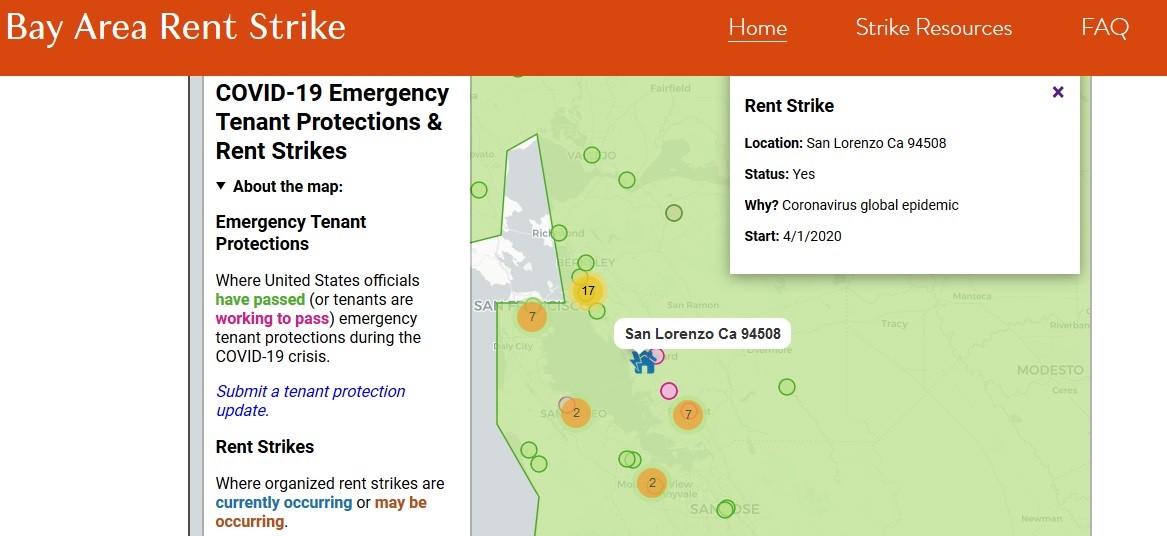
Growing Map of Rent Strikes Across Bay Area
Station 40, a long running collective housing complex in the San Francisco Mission District, has been public about launching a rent strike since March 16th. From an interview with CrimethInc. they stated:
As anarchists, as a collective, we have to imagine what could be next and to do what it takes to be a part of building that new reality. Getting free from rent (which is to say, theft) and debt amid a full-blown pandemic crisis seemed like the best possible way to start. We believe that the simple tactics of refusal (rent strike, sick-outs, redistribution of resources, mutual aid) are essential to getting through this situation. We hope the rent strike spreads. We have the best chance of survival and victory together.
Meanwhile, across the bay in Oakland, California:
A group of at least 20 calling themselves rent strikers are issuing Gov. Gavin Newsom their own 30-day notice to cancel all rent and mortgage payments during the current public health crisis. If he fails to act, renters across the state are planning to withhold rent payments beginning on May 1.
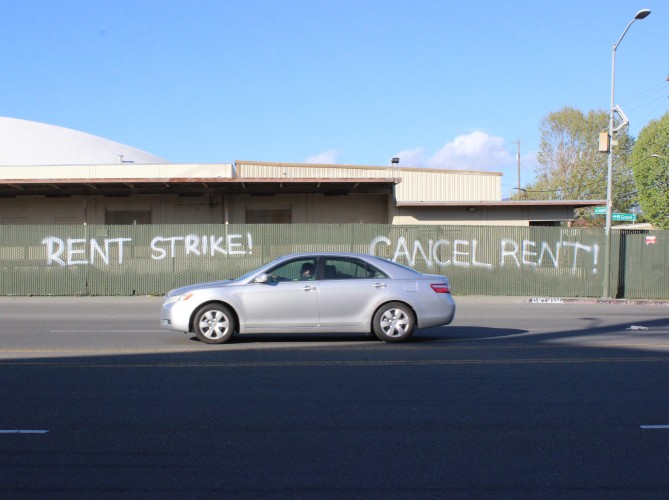
Rent Strike Graffiti in Oakland
The bay area – as has the rest of the country – has also been awash in rent strike graffiti and street art. On Twitter, Oakland Rent Strike has also been documenting various houses which are showing public support for the rent strike.
Southwest
In Southern California, the LA Tenants Union organized a home demonstration outside of the Mayor’s house calling for a freeze on rent along with a Comdia No Renta/Food Not Rent rally in support of the rent strike.
Meanwhile in San Diego:
“The damage is very real and many of our members have already suffered income/job loss due to the government `stay at home’ order and the widespread infection of the virus,” a statement issued by the San Diego Tenants Union reads. “As the working class, we recognize this as another opportunity that the wealthy use to exploit us.
“It is important to stand in solidarity with each other and know what’s coming. Save your money, stock supplies, communicate with your family and friends. Make emergency contingency plans and try to have cash readily available. Be compassionate and thoughtful. Help your neighbors and organize.”
The grassroots group said it had around 100 people participating in the rent strike, and had issued a letter to members to send to landlords.
Central
In Austin, Texas residents at the Concordia house have launched a rent strike. In a press release they wrote:
As millions of recently unemployed tenants across the country struggle today to pay rent, 11 residents of a building in Austin are going on rent strike and demanding that their landlord waive rent for the duration of the crisis. Over the past few weeks, some of the residents—who work as servers, gig contractors, and manual laborers—were laid off as the public health measures to contain the pandemic brought the economy to a standstill. When it became clear that many of the residents wouldn’t be able to pay rent, they decided to take collective action to ensure that no one faced this crisis alone.
We are joining the rent strike because this is our home. While shelter-in-place is in effect, we shouldn’t have to choose between rent payments, and affording food and medicine, because we can’t. We care for one another. We want to stand in solidarity with all who can’t pay, to make it safer for everyone impacted,” said Jax, a (manual laborer) who has been living in the building for the past two years.
In Austin, a rent strike carries particular significance, where 52% of residents are renters. The median household income of the average renter ($41,979) is less than half that of the average homeowner ($89,265). Most renters in Austin are just 1-2 missed paychecks away from not being able to pay their rent. The rise in rents and housing precarity over the past few years has been a major factor in gentrification throughout the city, a crisis which has disproportionately impacted the city’s working Black, Latinx, and immigrant populations. Although the City has given renters a 60 day grace period to come up with rent, unemployed renters will continue to fall behind, accrue late fees, and face eviction—setting the stage for an intensified housing crisis once the public health crisis has ended. “Without a rent suspension, the reality is that thousands of people will not pay their rent. This will trigger an unprecedented series of mass evictions as people struggle to recover financially after the pandemic has passed. All the while, landlords, real estate investors, and private equity firms will continue to profit off of tenants,” said Mukti, an organizer in the Rent Strike ATX campaign.
Also in Denver, Colorado, people are mobilizing nightly anti-rent noise demos and are pushing for rent strikes.
Midwest

In Kent, Ohio “around 100 Kent residents have joined the Kent Tenants Union” and have begun organizing campaigns and issuing demands to various landlords.
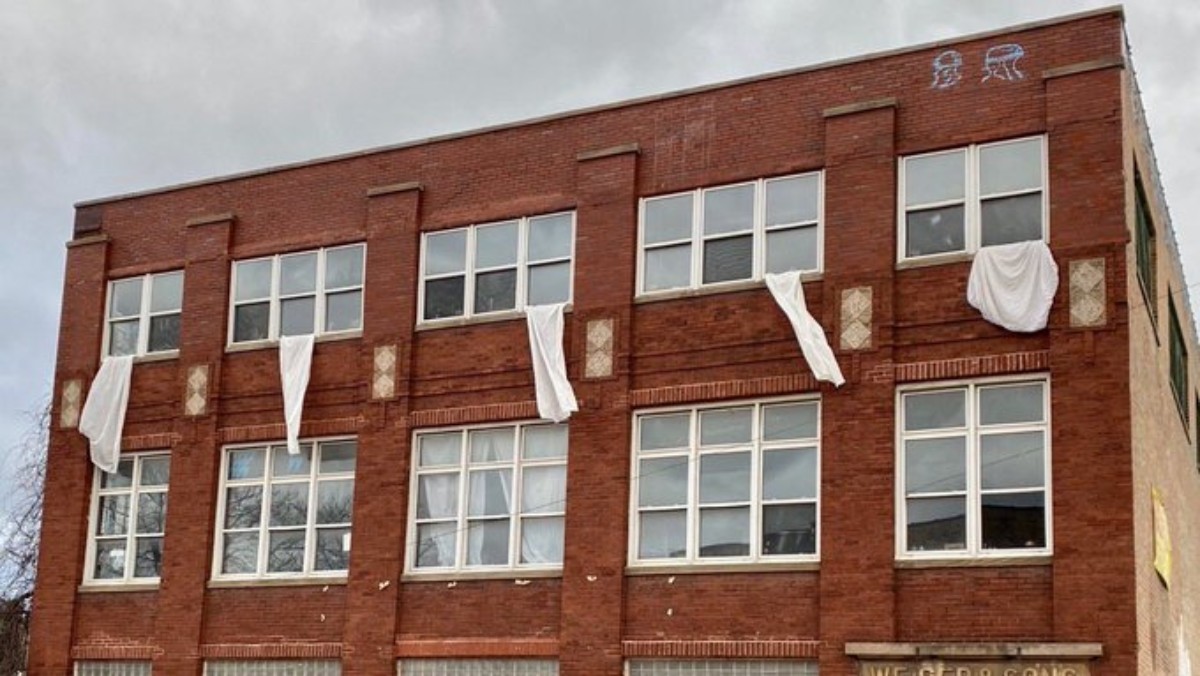
In Chicago, Illinois, renters in buildings owned by Mac Properties have vowed to strike:
The group of tenants, under the name Mac Tenants United, released a letter containing a list of demands and announcing the rent strike until those demands are met. Among those demands: that Mac, for the duration of the outbreak, halt evictions, cancel rent for all tenants, and not attempt to collect unpaid rent.
Zak Witus, one of the organizers behind Mac Tenants United and a graduate student at the University of Chicago, said that 32 tenants had pledged to go on rent strike as of Tuesday. (The pledges are being tracked through an online form.) About 60 people spread across 13 different Mac buildings are part of the entire effort.
The tenants also take a broader tack in the letter, arguing that Mac Properties and its owner, the real estate investment firm Antheus Capital, are attempting to “fundamentally change Hyde Park, Kenwood and Woodlawn by removing working class, black, and brown tenants, and then (replacing) them with rich tenants who can afford luxury apartments with high rents.”
Meanwhile, in Carbondale, Illinois, rent strikes are also popping off.
Lastly, in St. Louis, people are organizing in several different capacities. From one testimonial:
“We are a building comprised of fewer than five units in the Fox Park neighborhood of south city. We’ve all agreed to embrace the unknown and are attempting to withhold rent. Several of us have been laid off, some of us fortunate enough to retain jobs may not have them for long. Affording food is a main component in our health regimen. We are refusing rent this month out of necessity, to plan for days to come, and to act in solidarity with others, experimenting with care, by poking our fingers into the wounds of class society. Governmental bandaids won’t offer much, maybe it’s time to flatten the curve of these forms of life, or better yet, push them to a point of no return.”
– Fox Park Tenants
Southeast
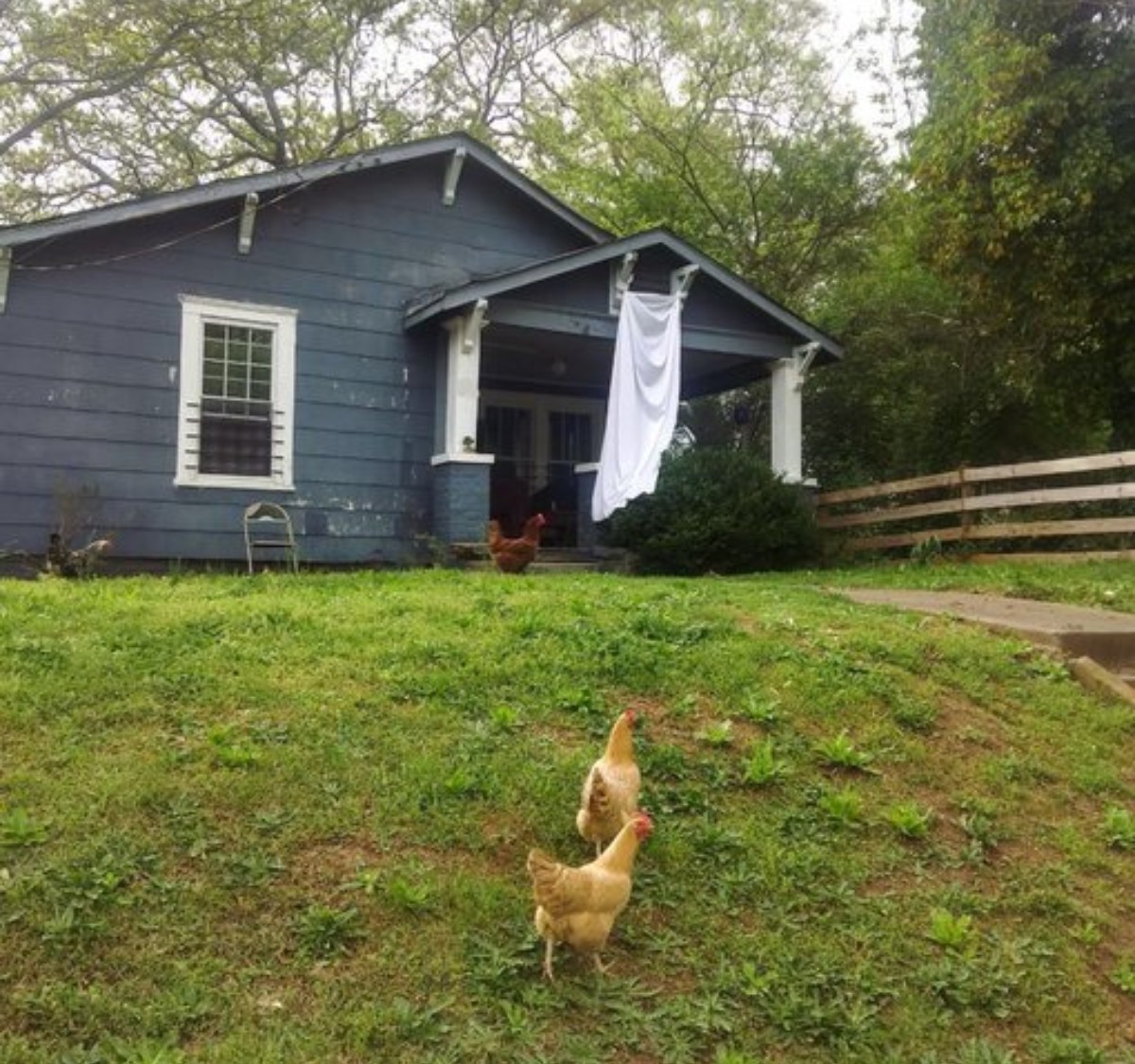
A house on rent strike in Atlanta, Georgia
In Atlanta, a local group reports that there are over 100 organized rent strikers and many more who are unorganized.
Northeast
Residents in Brooklyn, New York have launched a rent strike. In a press release they stated:
The tenant association asked Pacific Management’s head-officer, Isaac Schwartz, to come to the table to negotiate in good faith with his tenants, many of whom have already lost their jobs and will be unable to pay rent on April 1. Schwartz, who owns 50 rental properties in New York City, a portfolio valued at $87 million, failed to come to the table before April 1st, writing:
“Tenants and landlords are both having a hard time due to the COVID-19 pandemic. It is too early for us to know what the government wants us to do.”
Now the tenant association has formally declared they are on a rent strike.
“We need you to work with us to fight for statewide relief for both renters and owners in this moment of unprecedented crisis. Landlords must now make their own demands of the state and of the banks because renters have been ignored…”
They are continuing to call on Governor Cuomo to #CancelRent and utilities across the state during the COVID-19 public health crisis. They are also demanding that vacant state-owned and subsidized units be used to house the 92,000 New Yorkers currently without housing and that a significant re-investment be made in public, subsidized, and non-profit housing, which is essential to keeping people safe.
“No one should be made to choose between food, medical care, and housing, ever, especially during a global pandemic.”
So-Called Canada

Occupation of Vacant Community Center
In Vancouver, members of the Red Braid Alliance for Decolonial Socialism seized and squatted a vacant community center in so-called Surrey, BC. From a statement:
Homeless activists and supporters have taken over the publicly-owned and vacant North Surrey Recreation Centre in Surrey, declaring it the “Hothouse Squat.”
Squatters argue that in light of the COVID-19 pandemic, the squat is the safest place available to them to live.
The Hothouse Squatters argue that if the City of Surrey or RCMP evict them from the North Surrey Rec Centre, it would violate their Section 7 Charter Right to “security of the person” by putting them in danger of infection and death from COVID-19. They have named the squat “Hothouse” to draw attention to the dangerous conditions in the shelters, SROs, and modular housing that poor people are warehoused in.
Hothouse Squat founder and modular housing resident Eva Bardonnex said, “Homeless shelters and modular housing buildings are not spaces we can self-isolate from the virus. If one of us gets it, we’ll all get it. Shelters and mods are hothouses for the spread of COVID-19.”
The founders of the Hothouse Squat are calling for poor and homeless communities all over the Province to take over vacant buildings as part of the #SQUAT2SURVIVE movement, in an act of militant self-defense from COVID-19.
Across so-called Ontario, Rent Strike Kingston reported:
Thousands of people all over Canada have pledged to participate in a rent strike today in response to the COVID-19 pandemic. In Toronto alone, 130 landlords received letters from their tenants demanding no collection of April rent. We hope that folks who have done the same are feeling good here in Kingston.
Thousands of tenants across various working-class neighborhoods in Toronto are going on rent strike, organized through groups like Parkdale Organize and Keep Your Rent Toronto.
From Parkdale to North York, Mount Dennis to Leslieville, Torontonians are joining a North America-wide movement of tenants who aren’t paying rent on April 1, either because they can’t afford it or in solidarity with those who say they have been taken advantage of by landlords for too long.
Signs have been appearing on Toronto’s streets exhorting people to join. The words “NO APRIL RENT” have been scrawled across the concrete barrier wall of the Gardiner Expressway, while posters by the group Keep Your Rent can be found plastered on telephone poles and storefronts, and pinned to bulletin boards in apartment lobbies across the city.
Keep Your Rent is an offshoot of Parkdale Organize, the housing group that has staged rent strikes against above-guideline rent increases and aggressive tactics to push out lower-income tenants in Parkdale, as Toronto rents have become the most expensive in the country and vacancy rates dropped.
Bryan Doherty, a Parkdale tenant working with Keep Your Rent, says the current upswell of support for rent strikes isn’t just “an online phenomenon.” (Although the movement has gained a lot of traction online: A petition created by Toronto tenant Joe Rutherford calling for rent cancellation has over 760,000 signatures.)
“Thousands of people across the city are having this same conversation,” says Doherty. “No one knows how things are going to unfold, but what we know is that we need to organize with each other. Hashtags and petitions are not going to pull us out of the fire.”
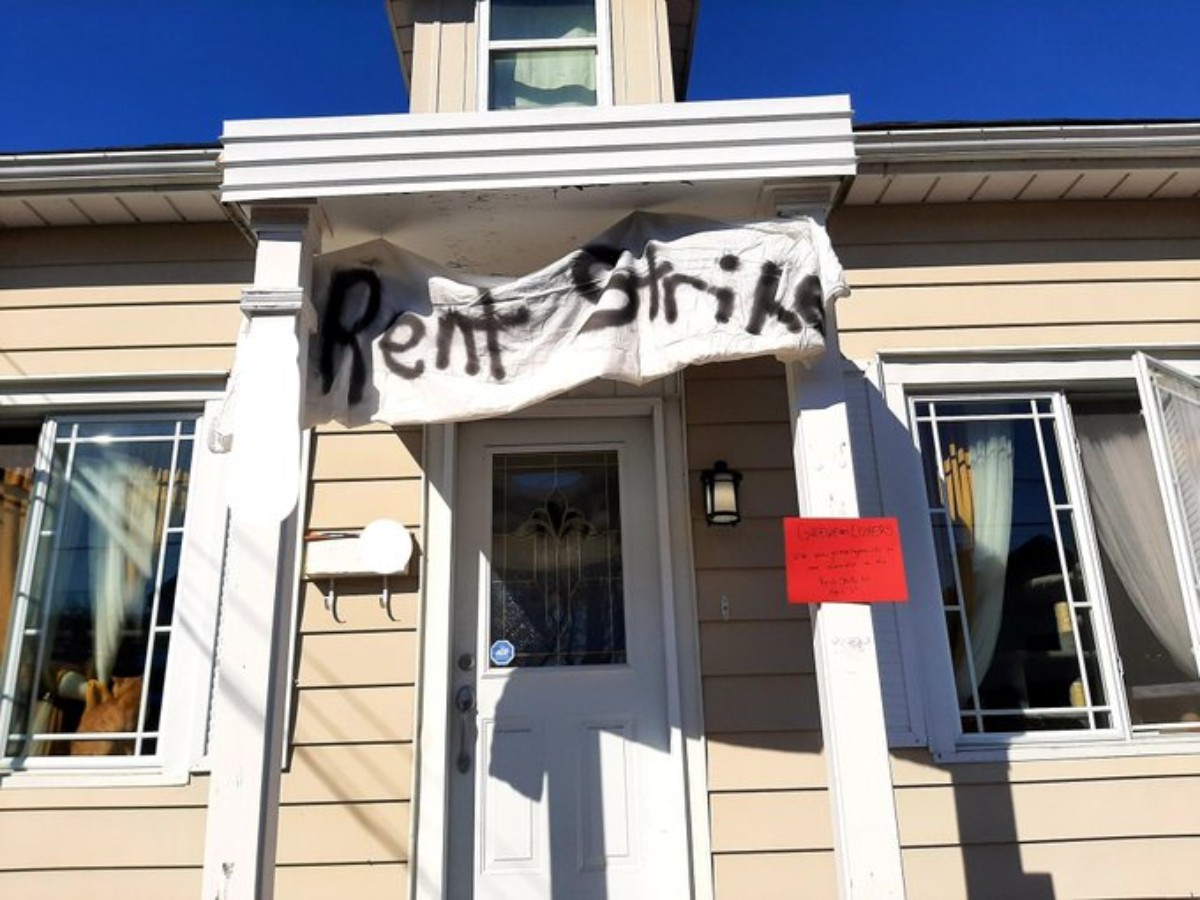
On Rent Strike in Montreal
Meanwhile in Montreal, almost 10,000 have signed an online petition organized by autonomous tenants to back the rent strike and demand a rent freeze. Across the city, people are displaying white sheets, a symbol of solidarity during the rent strike. The Twitter account Grève des Loyers has also been sharing statements of those on rent strike, such as:
“Because I am a low-income single mother, I am studying and currently spending a lot of food and cannot afford to pay my rent.”
– Cynthia, Montreal
Moreover, according to the central Montreal Rent Strike website:
In a building in the Rosemont-La Petite-Patrie district, precarious tenants of 10 apartments have decided to go on a rent strike in order to signify to their landlord their collective inability to pay rent.
“We are working together to ensure everyone stays safe. However, the current circumstances have put not only our physical, but also our financial health at risk,” explains Dexter Xurukulasuriya, one of the tenants. In a letter sent to their landlord, they ask for an understanding that “the inability for some to afford the rent is due to a public health crisis outside of anyone’s control, and that for the good of public safety”, they must be able to stay in their homes, “without fear of being able to pay for living expenses.”
“Of course, we realize that [our landlord] is also affected by this crisis, and are reassured to know that [landlords] have access to tools and relief measures such as mortgage deferral.” adds Xurukulasuriya.
Like other tenant groups and advocacy organizations, we’ll continue to support tenants and keep up the pressure to cancel rent! Other mutual aid tools will soon be made available for those who joined the rent strike, by choice or necessity.
Many tenants, including all those who won’t be able to access the emergency support measures, will have exhausted their small savings and have told us they will have even more difficulty this upcoming May 1.
In the meantime, white sheets keep being put up across Montreal, Quebec, and North America, demanding rent cancellation and support for those most affected by this crisis.
No one left behind!
Stay up with the movement by following the #RentStrike hashtag online and It’s Going Down.






Comments
Parkdale Organize have
Parkdale Organize have created this easy online form you can use to contact Toronto landlords who've been threatening tenants over non-payment of rent. If anyone feels like making phone calls as well, telephone numbers can be found here.